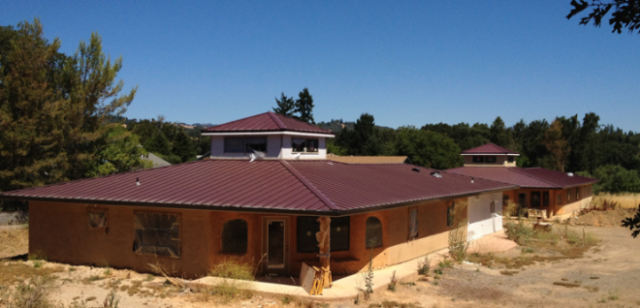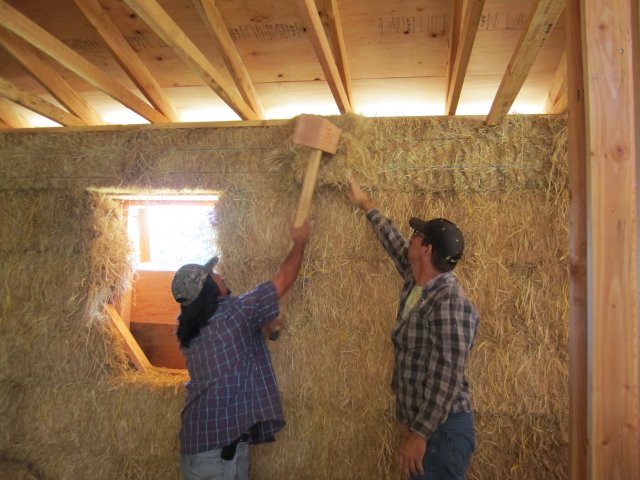Funding Opportunities for Tribal Green Building
Federal, Tribal, and some state agencies provide grants and loans that can be used to support Tribal green building.
Funding Resources
(Federal funding opportunities can be found at Grants.gov)
- Bipartisan Infrastructure Law and Inflation Reduction Act Federal Funding
- Environmental Protection Agency (EPA)
- Department of Energy (DOE)
- Housing and Urban Development (HUD)
- Database of State Incentives for Renewables and Efficiency
- Federal Tax Credits for Energy Efficiency
Bipartisan Infrastructure Law and Inflation Reduction Act Federal Funding
Bipartisan Infrastructure Law Tribal Playbook (pdf), May 2022: This playbook identifies program and sources of funds specifically set aside for Tribal communities under the law. There are over $13 billion dollars in Tribal-specific programs or set asides for Tribes within existing programs, including funding for energy efficiency, renewable energy and resilience. It also provides a guide to Tribal eligibility for other programs under the law and identifies specific benefits or flexibilities for Tribes and Tribal communities.
Guidebook to the Inflation Reduction Act’s Clean Energy and Climate Investments in Indian Country (pdf), April 2023: This guidebook provides an overview of the clean energy, climate mitigation and resilience, agriculture, and conservation-related funding programs in the Inflation Reduction Act for which Tribes are eligible. The guidebook also provides information on how Tribes can leverage new and expanded clean energy tax credits to reduce pollution and energy costs on Tribal lands. The law includes more than $720 million dollars in Tribal-specific programs or set-asides for Tribes within other programs.
Environmental Protection Agency
Indian General Assistance Program (GAP)
The goal of GAP (CFDA 66.926) is to assist Tribes and Inter-Tribal consortia in developing the capacity to manage their own environmental protection programs, and to develop and implement solid and hazardous waste programs in accordance with individual Tribal needs and applicable federal laws and regulations. Funding can be used to fund training and assistance associated with green and healthy building as well as sustainable building code development, and the development of inspections and enforcement programs under provisions for building legal and administrative capacity. Encouraging radon resistant construction is explicitly covered.
Eligibility: Federally Recognized Tribes and Inter-Tribal Consortia
Award Cycle Dates: Annually
Award Amounts: Varies
Details: Indian Environmental General Assistance Program (GAP)
How to apply: Grants.gov
EPA Environmental Justice Grants
EPA has historic funding levels to advance Environmental Justice, and many of these programs can support green building including energy-efficient, healthy, and resilient housing and buildings; low-carbon or sustainable building products; indoor air quality and renewable energy.
Details: Environmental Justice Grants, Funding and Technical Assistance
EPA Pollution Prevention Grants
Pollution prevention (P2), also known as source reduction, can support Tribal green building through technical assistance to businesses to advance energy efficiency, water conservation or practices to reduce the toxicity or embodied carbon in building materials and products.
Details: Pollution Prevention Grant Programs
EPA Smart Growth Grants and Other Funding
EPA's Office of Sustainable Communities occasionally offers grants to support activities that improve the quality of development and protect human health and the environment.
Details: Smart Growth National Funding Opportunities
U.S. Department of Energy (DOE)
Learn about Department of Energy grants. loans and technical assistance opportunities for Tribes and Alaska Native Villages to support energy systems, renewable energy and energy efficiency.
- Tribal Nations and Native Communities Resource Guide
- Current Funding Opportunities
- Ongoing Funding Opportunities
- Department of Energy Tribal Energy Products Database
- Past Funding Opportunities and Related Information
U.S. Department of Housing and Urban Development (HUD)
HUD's Funding Opportunities
The Department of Housing and Urban Development's Build for the Future Funding Navigator and Notice of Funding Availability (NOFA) Forecast lists competitive grant opportunities.
HUD Grants for Indian Housing and Community Development (Multiple Programs)
Indian Housing Block Grant (IHBG)
This is a formula grant that allows Tribes or Tribally designated housing entities (TDHEs) to provide a range of affordable housing activities on a reservation or Indian area. These activities are identified and described in an Indian Housing Plan (IHP) which is prepared each year and submitted to HUD for review and compliance with the Native American Housing Assistance and Self Determination Act (NAHASDA).
Eligible activities include model activities that provide creative approaches to solving affordable housing problems, housing development, and assistance to housing developed under the Indian Housing Program.
Eligibility: Federally recognized Indian Tribes or their Tribally designated housing entity (TDHE), and a limited number of state recognized Tribes who were funded under the Indian Housing Program authorized by the United States Housing Act of 1937 (USHA). With the enactment of NAHASDA, Indian Tribes are no longer eligible for assistance under the USHA.
Award Cycle Dates: Annually
Award Amounts: Varies
More Information: Indian Housing Block Grant (IHBG)
How to apply: Grants.gov
Indian Community Development Block Grant Program
Tribes and Alaska Native Villages may use block grants to improve the housing stock, provide community facilities, make infrastructure improvements, and expand job opportunities by supporting the economic development of their communities.
Under the Code of Federal Regulations, Title 24, Section 1003.202 eligible activities related to Tribal Green Building and Codes include:
- Comprehensive Planning – Comprehensive planning [can potentially include Tribal building code planning/development] can be proposed as part of any otherwise eligible project. Comprehensive planning is subject to the 20% limitation on the grant for planning and administration.
- Community Based Development Organization (CBDO) Assistance – Grantees may provide assistance to CBDOs to undertake activities related to neighborhood revitalization, community economic development, or energy conservation.
- Code Enforcement – Code enforcement in deteriorating or deteriorated areas where such enforcement, together with public or private improvements, rehabilitation, or services to be provided, may be expected to arrest the decline of the area.
- Rehabilitation Services – Services such as rehabilitation counseling, energy auditing, preparation of work specifications, loan processing, inspections, and other services related to assisting owners, tenants, contractors, and other entities.
- Energy Efficiency – Improvements to increase the efficient use of energy in structures.
- Water Conservation – Improvements to increase the efficient use of water through such means as water saving faucets and shower heads and repair of water leaks
- Lead Based Paint Abatement and Evaluation – Lead based paint abatement and evaluation can be proposed under a housing rehabilitation project.
- Renovation of Closed Buildings – such as closed school buildings, for use as an eligible public facility or to rehabilitate such buildings for housing
Eligibility: Any Indian Tribe, band, group, or nation (including Alaska Indians, Aleut, and Eskimos) or Alaska Native Village which has established a relationship to the Federal government as defined in the program regulations. In certain instances, Tribal organizations may be eligible to apply.
Award Cycle Dates: Annually
More Information: Indian Community Development Block Grant Program (ICDBG) - Grants
How to apply: Grants.gov
Indian Home Loan Guarantee Program
The loans may be used for the following activities:
- Purchase of an existing home;
- Construction of a home (stick-built or a manufactured home on a permanent foundation);
- Rehabilitation loans;
- Purchase and rehabilitation;
- Refinancing (Rate and Term, Streamline, Cash Out).
Eligible Borrowers:
- American Indians or Alaska Natives who are members of a federally recognized Tribe
- Federally recognized Indian Tribes
- Tribally designated housing entities
- Indian Housing Authorities
- Native Hawaiians can access homeownership loans through the Section 184A Program
Application Cycle Dates: Continuous
More Information: Indian Home Loan Guarantee Program
How to apply: Application Process for Tribal Borrowers and Application Process for Tribes and Tribally Designated Housing Entities
Title VI Tribal Housing Activities Loan Guarantee Program
The purpose of the Title VI loan guarantee is to assist Indian Housing Block Grant (IHBG) borrowers who want to finance eligible affordable housing activities, but are unable to secure financing without the assistance of a federal guarantee. A federal guarantee is a pledge by the U.S. Government to repay all or a portion of the unpaid principal balance and accrued interest for an obligation by a borrower to a lender after a default under the terms of the repayment agreement.
It may be used to:
- Create new housing
- Rehabilitate housing
- Build infrastructure
- Construct community facilities
- Acquire land do be used for housing
- Prepare architectural and engineering plans
- Fund financing costs
Eligibility: Tribes, Alaska Native Villages, and their Tribally designated housing entities that are Indian Housing Block Grant (IHBG) recipients. Borrowers must also demonstrate administrative and financial capacity.
Application Cycle Dates: Continuous
Loan Amounts: Varies
More Information: Title VI Tribal Housing Activities Loan Guarantee Program
How to apply: See Title VI Application Process


